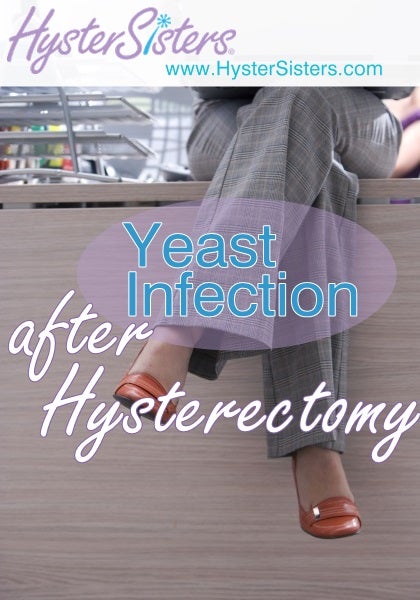HysterSisters Articles for Hysterectomy
SHARING IS CARING
Yeast Infection after Hysterectomy
From the Hysterectomy Recovery Articles List
 I have an icky vaginal discharge three weeks post-op from my hysterectomy. Do I have a yeast infection?
I have an icky vaginal discharge three weeks post-op from my hysterectomy. Do I have a yeast infection?
A white, cottage-cheese-like discharge, often accompanied by vaginal itching and inflammation, generally indicates a yeast infection. In recent years, the availability of over-the-counter medications for yeast infections has misled many women to believe that they can diagnose themselves with having a vaginal yeast infection and proceed to effectively treat it. Most of these self-diagnosed yeast infections, however, are wrong.
Particularly when you're early post-op, you don't want to treat yourself for something and think you're getting better, only to find out later that you were treating the wrong problem. In many cases, you could end up with something even worse. Please check with your
doctor if you notice any unusual
vaginal discharge or “unfamiliar happenings” in the vaginal area.
Using oral antibiotics is one of the biggest causes of yeast infections after a hysterectomy. Antibiotics administered to you in connection with the surgery do a great job killing off the "bad" bacteria that may cause other infections, but the antibiotics are indiscriminate in their action; that is, they also kill the "good" or "helpful" bacteria that exist in the vagina. When those good bacteria are eliminated, a yeast infection may occur.
Yeast infections are treated with anti-fungal agents. Often, women who are diagnosed with a yeast infection early in post-op are prescribed oral medication (e.g. Diflucan) as opposed to vaginally inserts of any kind. There also are creams like Monistat. These are not all alike; if you look at the label you will note that the active ingredients vary. When repeated yeast infections are a problem, it's important to vary which active ingredient you use to treat it, otherwise you may end up with a raging infection from now-resistant yeasts.
After the infection has been treated, there are things you can do to reduce the chance of getting another one. One is to limit your intake of sugar, which is one of the yeasts' favorite sources of food. Another thing you can do is to replace the "good" bacteria in the vagina and intestinal tract. The easiest way to do this is to take some type of probiotic, such as Probiotica or AZO Yeast (available at regular drug stores) or acidophilus capsules (at health food and drug stores). Eating plenty of yogurt (the kind that says "with live active cultures" on the label) can also work.
If your physician recommends it, it is also possible to put plain (unflavored, unsweetened) yogurt in the vagina directly. And some doctors will suggest douching with vinegar and water to restore the proper pH to the vagina, but please don't do this without your doctor’s approval.
This content was written by staff of HysterSisters.com by non-medical professionals based on discussions, resources and input from other patients for the purpose of patient-to-patient support.
04-12-2003 - 09:33 AM
SHARING IS CARING
Do you have a question?
If you have a medical support question related to this article, come JOIN US in our HysterSisters Community Forums. You will receive helpful replies to your questions from our members. See you there!
HysterSisters Articles
Diagnosis
Options to Hysterectomy
Treatment Alternatives
Pre-Op Hysterectomy
Post-Op Hysterectomy
Separate Surgeries
Hormone and Menopause
Intimacy after Hysterectomy
Pelvic Floor
Separate Surgeries
Fitness after Hysterectomy
GYN Cancer
Breast Health
Grief and Loss
Endometriosis
Uterine Fibroids
GYN Genetics
Hysterectomy Stories
Ask A Doctor

Find a Surgeon
Ellen Wilson, M.D.
5323 Harry Hines Blvd - Dept of OBGYN
Dallas TX 75390
214-648-4747 |
Antonio Gargiulo, M.D.
Brigham and Women's Hospital
75 Francis Street
Boston MA 02115
617-732-4222 |
Ted Lee, M.D.
Magee Womens Hospital
300 Halket Street
Pittsburgh PA 15213
412 641 6412 |
Joseph S. Valenti, M.D.
2805 S. Mayhill Road
Denton TX 76208
940 591-6700 |
Arnold Advincula, M.D.
Columbia Ob/Gyn Midtown
51 West 51st St, 3rd FL
New York NY 10019
(855) 75-OBGYN |
Mayra J. Thompson, M.D.
5323 Harry Hines Blvd Dept OBGYN
Dallas TX 75290
214-645-3888 |
James Kondrup, M.D.
161 Riverside Drive
Suite 109
Binghamton NY 13905
607-770-7074 |
Lori Warren, M.D.
3900 Kresge Way
Suite 30
Louisville KY 40207
502-891-8700 |
Caren C Reaves, M.D.
Caring for Women
2805 S. Mayhill Rd
Denton TX 76208
940-591-6700 |